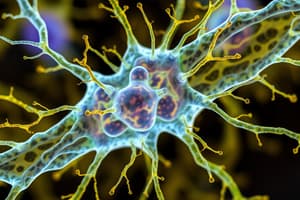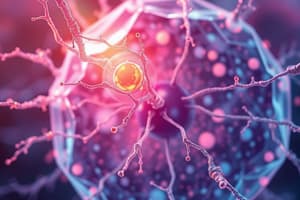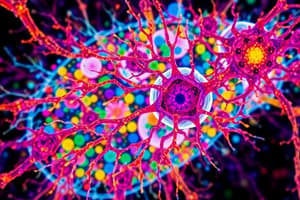Podcast
Questions and Answers
What is the primary function of cilia in the respiratory tract?
What is the primary function of cilia in the respiratory tract?
- Production of energy
- Propelling sperm cells
- Movement of fluids such as mucus (correct)
- Filtration of air particles
Which arrangement of microtubules is characteristic of cilia and flagella?
Which arrangement of microtubules is characteristic of cilia and flagella?
- 9+3 arrangement
- 10+2 arrangement
- 8+4 arrangement
- 9+2 arrangement (correct)
What role do dynein proteins play in the movement of cilia and flagella?
What role do dynein proteins play in the movement of cilia and flagella?
- Energy production for movement
- Driving the sliding of microtubule doublets (correct)
- Stabilization of microtubules
- Supporting cell membrane structure
Which protein is primarily associated with intermediate filaments in epithelial cells?
Which protein is primarily associated with intermediate filaments in epithelial cells?
How do actin filaments contribute to cellular motility?
How do actin filaments contribute to cellular motility?
What is the function of microtubules during cell division?
What is the function of microtubules during cell division?
Which of the following statements regarding microfilaments is correct?
Which of the following statements regarding microfilaments is correct?
Which category of cytoskeletal element plays a role in vesicle transport inside cells?
Which category of cytoskeletal element plays a role in vesicle transport inside cells?
What is the primary role of microtubules in the cell?
What is the primary role of microtubules in the cell?
Which statement accurately describes kinesins?
Which statement accurately describes kinesins?
What are microtubule-organizing centers (MTOCs) responsible for?
What are microtubule-organizing centers (MTOCs) responsible for?
How do dyneins primarily function within the cell?
How do dyneins primarily function within the cell?
What characterizes the structure of microtubules?
What characterizes the structure of microtubules?
What happens at the plus end of a microtubule?
What happens at the plus end of a microtubule?
What is a key function of the mitotic spindle formed by microtubules?
What is a key function of the mitotic spindle formed by microtubules?
Which of the following options describes the centrosome?
Which of the following options describes the centrosome?
Flashcards are hidden until you start studying
Study Notes
Cytoskeleton Overview
- The cytoskeleton is a structural framework consisting of protein filaments that maintains cell shape, organizes internal components, and facilitates cellular movements including transport and division.
Major Components
Microtubules
- Composed of hollow tubes made from alpha- and beta-tubulin proteins, exhibiting polarity with a plus end (rapid growth) and a minus end (anchored at the Microtubule-Organizing Center, MTOC).
- Function to maintain cell shape, act as tracks for intracellular transport of vesicles and organelles, and form the mitotic spindle for chromosome segregation during cell division.
Intermediate Filaments
- Provide mechanical strength and resist tensile stress, composed of various proteins (e.g., keratin in epithelial cells, vimentin in connective tissue).
- Functions include maintaining cell structure, stabilizing organelles, and allowing cells to withstand mechanical stress, particularly in muscle and skin.
Microfilaments (Actin Filaments)
- Formed from helical structures of actin monomers, known for their dynamic nature of continuous polymerization and depolymerization.
- Offer mechanical support, enable cell motility through lamellipodia (sheet-like projections) and filopodia (spike-like projections), play roles in cytokinesis during cell division, and facilitate muscle contraction via interactions with myosin motor proteins.
Motor Proteins
Kinesins
- Transport cargo toward the plus end of microtubules, typically moving towards the cell's periphery.
- Important in the transport of vesicles and organelles, notably during synaptic transmission in neurons.
Dyneins
- Move cargo toward the minus end of microtubules, directing movement toward the cell center.
- Involved in organelle positioning, retrograde transport, and the movement of cilia and flagella.
Microtubule-Organizing Centers (MTOCs)
- Nucleate and anchor microtubules, with the centrosome being the primary MTOC in animal cells, located near the nucleus and comprised of two centrioles.
- Crucial for directing microtubule growth, especially during cell division by forming spindle fibers.
Cilia and Flagella
- Hair-like structures essential for cell movement or fluid movement across surfaces.
- Characterized by an axoneme structure featuring a 9+2 arrangement of microtubules (9 doublets surrounding 2 central microtubules).
- Cilia are short and numerous, moving fluids (e.g., mucus), while flagella are longer and singular, propelling cells (e.g., sperm). Movement is powered by dynein, which allows microtubule doublets to slide and create bending motion.
Cellular Motility
Actin-based Motility
- Involves actin filaments pushing the plasma membrane to form lamellipodia and filopodia.
- The interaction of actin and myosin generates contractile forces that propel the cell body forward.
Microtubule-based Motility
- Utilizes microtubules and motor proteins to facilitate intracellular movement, including vesicle transport and organelle positioning.
- In cilia and flagella, microtubules support cell movement, such as during sperm motility.
Cell Division
- Microtubules form the spindle apparatus during mitosis, ensuring proper chromosome separation to facilitate equal distribution to daughter cells.
Studying That Suits You
Use AI to generate personalized quizzes and flashcards to suit your learning preferences.





